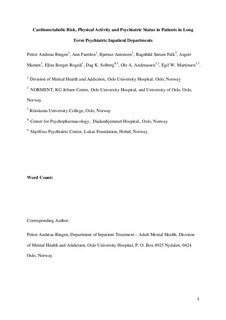Cardiometabolic risk factors, physical activity and psychiatric status in patients in long-term psychiatric inpatient departments
Ringen, Petter Andreas; Færden, Ann; Antonsen, Bjørnar Torske; Falk, Ragnhild Sørum; Mamen, Asgeir; Rognli, Eline Borger; Solberg, Dag Kristen; Andreassen, Ole Andreas; Martinsen, Egil Wilhelm
Journal article, Peer reviewed
Submitted version
Permanent lenke
http://hdl.handle.net/11250/2585114Utgivelsesdato
2018-03-09Metadata
Vis full innførselSammendrag
Purpose: Cardiovascular diseases are a major cause for the markedly reduced life expectancy in people with severe mental illness (SMI). Hospital departments should provide adequate prevention of cardiometabolic risk by optimizing prevention and treatment. Characteristics of cardiometabolic risk factors in inpatients are still not well known. We aimed to describe the status of cardiometabolic risk factors in inpatients with SMI and identify associations with psychiatric status and treatment.
Methods: A cross sectional descriptive study of inpatients with SMI from long term psychosis treatment wards in South Eastern Norway was performed. Comprehensive assessments of cardiometabolic risk factors, physical activity, lifestyle habits, symptoms, life satisfaction and treatment were made. Associations and potential prognostic factors were analyzed using linear and logistic regressions.
Results: A total of 83 patients were included in the study, but many individual datasets were incomplete. Over half of the subjects had unhealthy eating habits. Obesity (class 1–3) was found in 44%, 23% had elevated fasting triglycerides, 26% had elevated blood pressure and 78% smoked daily. Low levels of physical activity were significantly associated with higher levels of depression (p = .007). A nominal increase in cardiometabolic risk factors was found for olanzapine and clozapine users.
Conclusion: Inpatients in long term psychosis treatment wards have alarmingly high cardiometabolic risk. Level of physical activity was associated with both psychiatric and somatic health. Focus on lifestyle and somatic health should be an integral part of the treatment for hospitalized SMI patients.

